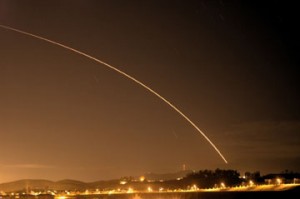California’s Space Clout
Yesterday, the California Space Authority kicked off California Space Week Washington, D.C.

Yesterday, the California Space Authority kicked off California Space Week Washington, D.C., when representatives from the Golden State's space industry head east for an annual business trip to the nation's capital for face time with all the right people. As their web site says, "It's that time again—time to travel to Washington, D.C., to educate federal officials regarding vital space policy issues. We will meet with Congressional members and staff as well as executive branch officials from the White House, Department of Defense, NASA, Department of Labor, Department of Commerce, and the Department of State to discuss issues related to civil space, national security space, education and workforce, and export controls." Translation: Keep the business comin'!
To get things rolling, the California Space Authority, a nonprofit corporation representing the commercial, civil, and national defense/homeland security interests of California's space industry, held a press conference yesterday at Washington's National Press Club where they released an annual report detailing the magnitude of the state's space industry.
California stands head-and-shoulders above all other states for space-related work, boasting 44 percent of the U.S. space market. It even accounts for 21 percent of the world's space market. The industry contributes $77 billion in "total economic impact" to California, creating and sustaining more than 370,000 jobs that paid $19 billion in wages last year. Space work has a greater impact on California's revenue and jobs than entertainment, tourism, agriculture, or any other industry, the report claims. More than a third of the world's satellite manufacturing takes place in California, and the state receives more than half of the Defense Department's $18.6 billion space budget. It is home to three of NASA's ten centers, accounting for $2.2 billion of NASA's $17.3 billion budget, while last year the state's private space companies vacuumed up more than a fifth of the $14 billion NASA handed out to companies around the nation. California-based businesses such as SpaceX, Scaled Composites, Interorbital, SpaceDev, and XCOR also form a critical mass in the new and rapidly growing segment of private space companies.
Today, Governor Arnold Schwarzenegger is meeting on Capitol Hill with friends from Space Florida, another key player in the space biz, talking with relevant officials from the Obama Administration and other branches of government. Senator Dianne Feinstein takes the baton tomorrow. Specific issues include the importance of addressing ITAR (International Traffic In Arms Regulations) restrictions on commercial satellite providers, and how to optimize the use of the International Space Station's National Laboratory. This is the second year that Space Florida has joined the California group.
"While many think of space enterprise as rocket scientists and defense contractors," says Andrea Seastrand, Executive Director of the California Space Authority, "applications from space-based technologies are widely used throughout many other industries. Environmental studies, crop infestation, water use monitoring, and oceanic observation all rely on space capabilities. Space enterprise is an enabler that stimulates entrepreneurial investment, innovation, and the economy."